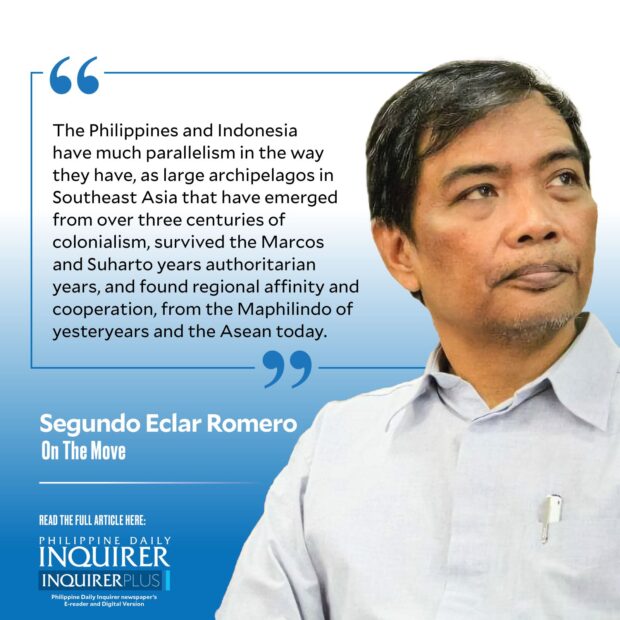Why Indonesians elect better presidents

Tomorrow, Feb. 14, will be a day of romance, fun, and frivolity for many Filipinos, but it will be a serious “festival of democracy” decision point for Indonesians. They will choose the successor to President Jokowi Widodo who completes a second five-year term with an astounding approval rating of 80 percent.
Whatever the outcome of tomorrow’s elections, Indonesians would have elected a president better than Filipinos have. The main reason for this is that Filipinos have cemented into their Constitution hopeless fragmentation and lack of continuity in their election of a president.
First, Filipinos, under the current interpretation of a multiparty system provided in the 1987 Constitution, get confused by as many as eight presidential candidates who are long on promises but short on viable programs of government. In the Indonesian elections tomorrow, there are only three candidates identified with political parties and platforms who are sufficiently distinct in the eyes of the Indonesian electorate.
Article continues after this advertisementSecond, with so many candidates, the winning President is almost always only a plurality president. Indonesia’s presidential election system requires a runoff—a second round of voting between the top two candidates—if no one wins more than 50 percent of the votes in tomorrow’s election. If needed, the runoff is scheduled for June 26.
Fourth, Filipinos have designed a six-year presidential term with no reelection—too long for a bad president, but too short for a good president. In the case of Indonesia, they give a second term for a successful leader, shunning a third term to forestall authoritarian or dynastic tendencies.
Third, Filipinos elect their vice president separately from the president usually from a different political party. Being a “heartbeat away” from the president, the vice president becomes the biggest risk to the president finishing his term of office. In Indonesia, the vice president is paired and voted with the president as is the practice in the United States.
Article continues after this advertisementFourth, Filipinos know what these presidential constitutional pitfalls are. However, the ghost of Marcos’ authoritarian rule prevents the amendment of the Constitution. As various presidents and members of Congress have desperately resorted to trickery like the current “people’s initiative” to stampede the people into Charter change, the more the people harden their opposition to it. Ironically, it now becomes harder to initiate an honest-to-goodness amendment of the Constitution to cure its many infirmities. No such dilemma bedevils the Indonesians—they got the correct presidential formula the first time.
We are not entirely helpless, only unimaginative and hardheaded. Congress should wake up to the reality that they should be the change they seek. They should look beyond their collective self-interest to cure the sick political system by other means. They can start by fixing the broken political party system by passing laws that incentivize programmatic political parties that present people with candidates that champion real meaningful political platforms. The state should substantively defray the costs of political campaigns as political education events. Funding support should be keyed to the demonstrated vote-getting strength of political parties so that political candidacy will not be the exclusive privilege of the rich and famous.
Congress should also repair the broken party list system that parodies the constitutional desire to give voice to the poor, vulnerable, disadvantaged, and marginalized sectors of the country. For good measure, they should think of how to realistically implement the constitutional ban on political dynasties.
There should also be a sense of delicadeza and self-restraint among top leaders. They should depart their positions not as politicians but as statesmen, upholding the constitutional imperatives. Former presidents should not use their residual presidential influence for malicious selfish political machinations.
The Philippines and Indonesia have much parallelism in the way they have, as large archipelagos in Southeast Asia that have emerged from over three centuries of colonialism, survived the Marcos and Suharto years authoritarian years, and found regional affinity and cooperation, from the Maphilindo of yesteryears and the Asean today.
Indonesia has a lot of the challenges that bedevil the Philippines such as poverty, inequality, corruption, nepotism, foreign debt, and predatory foreign encroachment over their seas. But Indonesia is clearly on a path and tempo that should inspire our president, Congress, and the bureaucracy. Failing this, the Philippines could be floundering, in a decade or so, in the wake of Indonesia as it overtakes us and plunges way ahead to join Singapore, Malaysia, and Vietnam on the horizon.
doyromero@gmail.com
















